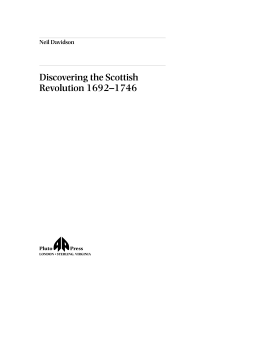
Additional Information
Book Details
Abstract
*Shortlisted for the Deutscher Memorial Prize 2003*
This book is a reassessment of Scottish politics and society in the late seventeenth and early eighteenth century. Neil Davidson argues that Scotland experienced a revolution during this period that has rarely been recognised in the existing historiography.
Davidson explores the political and economic changes of these years, revealing how social and economic power was transferred from one class to another. He describes how Scotland was transformed from a backward and feudal economy to a new centre of emergent capitalism.
He traces the economic and social crisis that led to Scotland's incorporation into the Union in 1707, but argues that the Union did not lead to the transformation of Scottish society. The decisive period was instead the aftermath of the last Jacobite revolt in 1746, whose failure was integral to the survival and consolidation of British, and ultimately global capitalism.
'A provocative new book - restores the tradition of narrative to the art of history writing'
The Scotsman
Table of Contents
| Section Title | Page | Action | Price |
|---|---|---|---|
| Contents | vii | ||
| Introduction | 1 | ||
| Three Interpretations of the Anglo- Scottish Union | 1 | ||
| Contextualising the Treaty of Union | 4 | ||
| Marxism and the Scottish Revolution | 5 | ||
| Patterns of Bourgeois Revolution | 9 | ||
| The Bourgeois Revolution in Scottish History | 15 | ||
| 1. Scotland in the Late Seventeenth Century | 17 | ||
| Lords, Peasants and Industrial Serfs | 17 | ||
| Burgesses and Indwellers | 34 | ||
| Officers, Lawyers and Ministers | 45 | ||
| Highland and Lowland | 52 | ||
| The Balance of Social Forces | 70 | ||
| 2. Three Dimensions of Socio- economic Crisis ( the 1690s) | 73 | ||
| Trade Wars and Shooting Wars | 78 | ||
| Death in the Face of the Poor | 86 | ||
| The Debacle of Scottish Colonialism | 94 | ||
| The Balance Sheet of the 1690s | 101 | ||
| 3. From Hanoverian Succession to Incorporating Union ( 1700 1707) | 104 | ||
| Class and Party in the Last Scottish Parliament | 108 | ||
| A Class Divided | 116 | ||
| A Union is Announced | 121 | ||
| The Struggle Over Ratification | 131 | ||
| Explaining the Union | 159 | ||
| 4. Scotland and the British State: From Crisis to Consolidation ( 1708 1716) | 173 | ||
| Three Perspectives on Jacobitism | 173 | ||
| The British State versus Scottish Society? | 190 | ||
| 1715: Dress Rehearsals for the End | 196 | ||
| 5. Social Transformation and Agricultural Improvement ( 1717 1744) | 205 | ||
| The Consequences of Combined and Uneven Development | 206 | ||
| The Pivotal Role of Agriculture | 209 | ||
| The Lowlands | 214 | ||
| The Highlands | 220 | ||
| 6. The End of the British Revolution ( 1745 1746) | 228 | ||
| Two Sources of the 45 | 229 | ||
| Victims of a Dying Feudalism | 236 | ||
| In the Hour of Civil War | 241 | ||
| Endgame | 255 | ||
| Barbarians and Enemies of All Civil Society | 261 | ||
| The End of Feudalism in Scotland | 267 | ||
| Epilogue: The Scottish Path to Capitalist Development ( 1747 1815) | 272 | ||
| Theoreticians and Practitioners of Passive Revolution | 275 | ||
| The Revolution After the Revolution | 281 | ||
| A Different Class of Beings | 284 | ||
| Conclusion | 286 | ||
| A Revolutionary Alternative from Below? | 289 | ||
| Culloden, the Highland Clearances and Capitalist Development | 294 | ||
| Documents of Civilisation and Barbarism | 299 | ||
| Appendix: Marx and Engels on Scotland | 302 | ||
| British Capitalism | 302 | ||
| Political Economy and the Scottish Enlightenment | 303 | ||
| The Scottish Reformation | 304 | ||
| The Constitutional Form of the British State | 304 | ||
| Bibliographical Essay | 307 | ||
| Notes and References | 311 | ||
| Index | 364 | ||
| Aberdeen | 34 |
